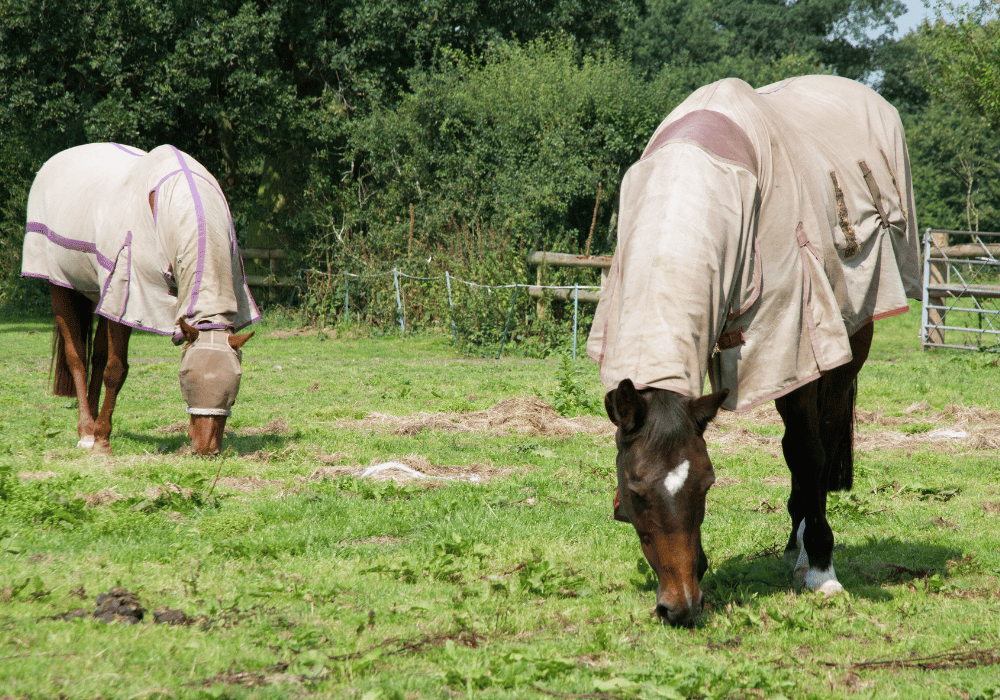Sweet itch is a common skin condition that can affect horses, ponies and donkeys year-round, although the condition is at its worst between March and November. This skin condition affects around 5% of horses and can be immensely frustrating for both horse and owner.
Horses with sweet itch have an allergic reaction to the saliva of biting insects, leading to a localised irritation within the skin. Horses with severe sweet itch symptoms can cause damage to themselves and their environment trying to relieve their itching. For example, horses can damage fencing by constantly rubbing against it.
Sweet Itch Symptoms
Sweet itch symptoms vary in severity from horse to horse. The most common sweet itch symptoms include:
- Excessive itching
- Hair loss where the horse has been bitten
- Excessive grooming
- Vigorous tail swishing
- Excessive rolling
- Head shaking and restlessness
- Changes in behaviour - for example lethargy, agitation, irritability, impatience
Diagnosis of the condition is usually confirmed based on the clinical signs. You can find out more about the symptoms of sweet itch in our other blog article.
Sweet Itch Treatment for Horses
There are options when it comes to sweet itch treatment for horses, although there is no cure. Treating the condition can reduce symptoms and make your horse more comfortable.
Steroids can offer relief from itching in the short term. These are often used to treat horses in need of immediate relief. Side effects should be considered, especially if this sweet itch treatment is used long-term.
Other treatments used to help reduce sweet itch symptoms include anti-itch shampoos and creams. These can help reduce itching, specifically those which contain antihistamines.
Humectant and emollient sprays can also help. Humectant spray can help soothe the top layer of skin, while emollients are oil-based solutions which prevent water loss. This will help to prevent the skin from drying out.
Managing Sweet Itch in Horses
While sweet itch symptoms can be reduced using different treatments, the condition cannot be cured, and therefore effective management is paramount. You should begin managing sweet itch before the midges come out in early spring, when the temperature is still cold.
Owners of horses with sweet itch should aim to minimise the horse’s exposure to midges and other biting insects.
The first port of call should be a decent fly rug and fly mask. Specially designed sweet itch rugs offer protection from ear-to-tail to prevent midges from getting to your horse’s skin. The worst affected horses will need a sweet itch rug 24/7, year-round, so it’s essential that the rug fits properly.
A good fly repellent is also important. There’s a huge number of brands available on the market, both in spray and cream form. Anti-itch cream can help soothe affected areas, while a strong fly spray can prevent midges from biting.
Insecticide sprays can be used periodically on the horse and its rugs to reduce fly contact. Deosect is an example and can be obtained from your vet.
In recent years the vaccine for ringworm has been administered to horses with sweet itch ahead of the midge season. This vaccine appears to reduce sweat itch symptoms in some horses, even though it was not the original intended purpose of the vaccine.
It can be worth stabling your horse from around 4pm to 8am, when the midges are worst. Insect-proof mesh on the windows of the stable can prevent midges from getting in. You could also install a ceiling fan, as midges are unable to fly against strong currents.
Finally, you should consider where your horse is kept. Midges are most prevalent around standing water and woodland, as well as areas where there is little wind. If possible, you should move your horse to a more exposed field, or else fence off low lying areas where water can pool.
Avonvale Equine Vet Practice
Sweet itch can be a frustrating condition for both horse and owner, but preventative measures as well as the correct sweet itch treatment can help make the condition more bearable. At Avonvale Equine Vet Practice, we are always happy to advise our clients on sweet itch and other ailments. From our equine vet clinic near Banbury, we carry out routine and emergency equine vet services. We also operate a free weekly zone visits scheme, which is ideal for routine, non-emergency appointments.
If you believe your horse, pony, donkey or mule is suffering from sweet itch, or you’d like more information and advice, register your horse with us today.








